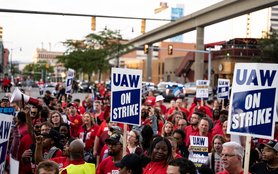What is the nineteenth of June but a day that reveals--more than any other day throughout the year--the gross injustice and cruelty which many people endure in this country? A federal holiday is a nice step, but we have a long way to go.
Juneteenth commemorates June 19, 1865, when those enslaved in Galveston, Texas were finally freed (nearly two years after the Emancipation Proclamation went into effect in 1863).
However, it wasn’t until I attended Hampton University, the site of the very first reading of the Emancipation Proclamation in the South (under what is now called “Emancipation Oak”), that I learned the true meaning of Juneteenth.
To that point, I had spent 13 years going to school in a predominantly white community--a community that welcomed me, but not with open arms. I spent many years being the only Black face in a classroom. For years, every February, I was expected to lead on all things Black History; it was my job to teach my classmates about “my history”--never did anyone think I was in school to learn that history as well.
Why would any teacher in a predominately white community teach me about Juneteenth… when they themselves knew nothing about it? Having dealt with that my entire primary educational years, it was the driving force of why it was so important for me to attend an HBCU (Historically Black Colleges & Universities). To go to a school where learning about my people, my community, and my history was a top priority.
What, to the Slave, is the Fourth of July
On July 5, 1852, Frederick Douglass gave one of his most famous speeches, “What, to the Slave, is the Fourth of July.” 170 years later, replace the word “Slave” with “Black,” and the similarities are striking.
Douglass proclaims that positive statements about American values--such as liberty, citizenship, and freedom--were an offense to the enslaved population of the United States because of their lack of freedom, liberty, and citizenship. Douglass referred not only to the captivity of enslaved people, but to the merciless exploitation, cruelty, and torture that these people were subjected to in the United States.
While the “ending of slavery” is of course something to celebrate, it’s also a time to commemorate the resilience, resourcefulness, and grit of my ancestors. Juneteenth is a day to pay tribute to all they endured.
However, the mere fact that this Holiday is based on a date that involves lying to enslaved people, and delaying their freedom, is not lost on me.
Still not safe to be Black in America
The Texan slave owners who denied the result of the Civil War show an eerie resemblance to the people today who cling tight to the lie of voter fraud during the 2020 Presidential election. The reality is that restricting the Black vote is as American as good old apple pie.
Despite the end of legal slavery, it has never been entirely safe to be Black in America. Newly freed Blacks endured traumatic and violent retaliation from white Americans. Widespread lynchings and mass incarceration plagued the Black community.
In recent years, especially in the aftermath of the George Floyd murder, it has become an urgent priority for white people to avoid being called racist--while at the same time avoiding the dismantling of systemic racism.

It wasn’t until June 17, 2021--38 years since the creation of the last federal holiday, Martin Luther King Jr Day--that President Joe Biden and Congress decided to make Juneteenth a federal holiday. The collective list of demands from Black Americans--which included everything from reparations to upholding democracy by way of fair and ethical voting rights, to name just a few--was ignored. I believe there are more pressing bills that could have been signed before making Juneteenth a federal holiday.
The effort to stifle conversation and transformation rolls on. Currently, more than 25 states have introduced bills or taken other steps that would restrict teaching critical race theory or limit how teachers can discuss racism and sexism. The time is now to finally come to terms with this nation’s inception.
Today, I keep in mind this powerful quote from Malcom X: “The white man will try to satisfy us with symbolic victories rather than economic equity and real justice.”
A federal holiday is a nice step, but we have a long way to go.
________________________________________________________
More on Juneteenth: A rundown of some legislation that would address systemic racism.



